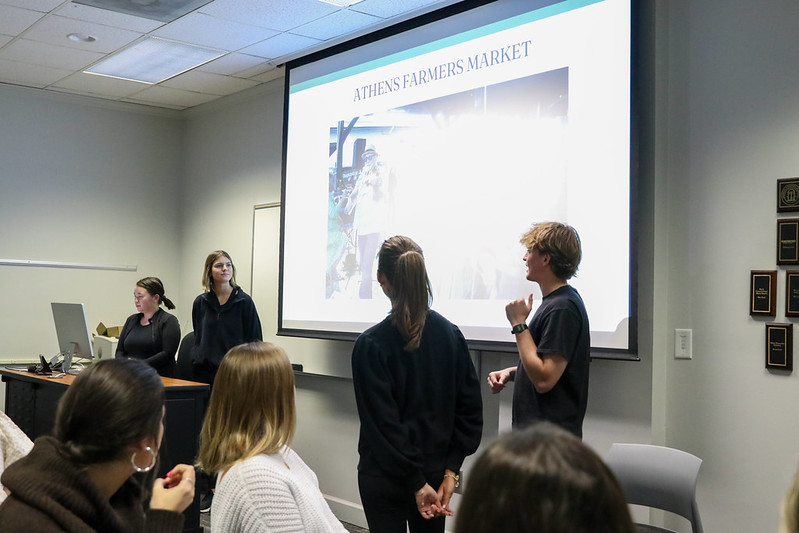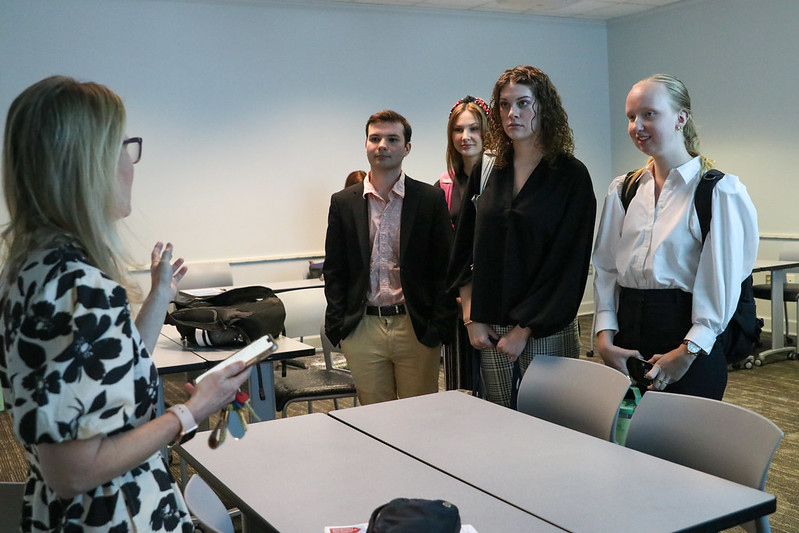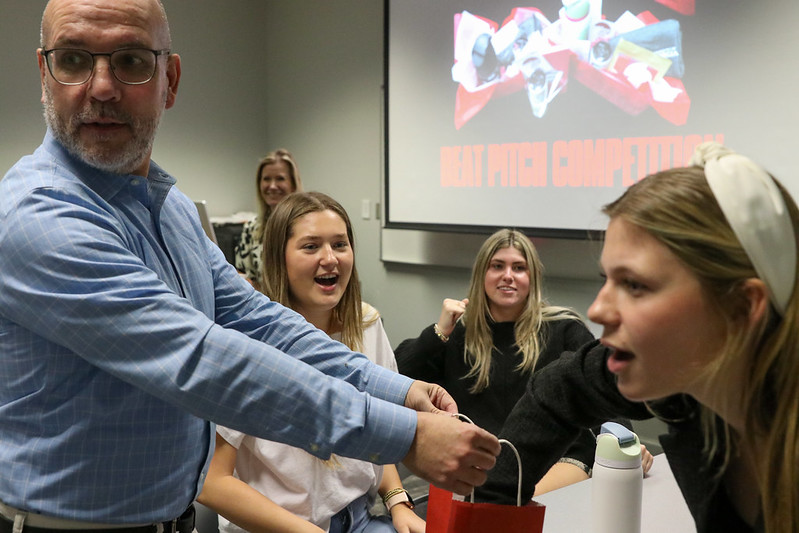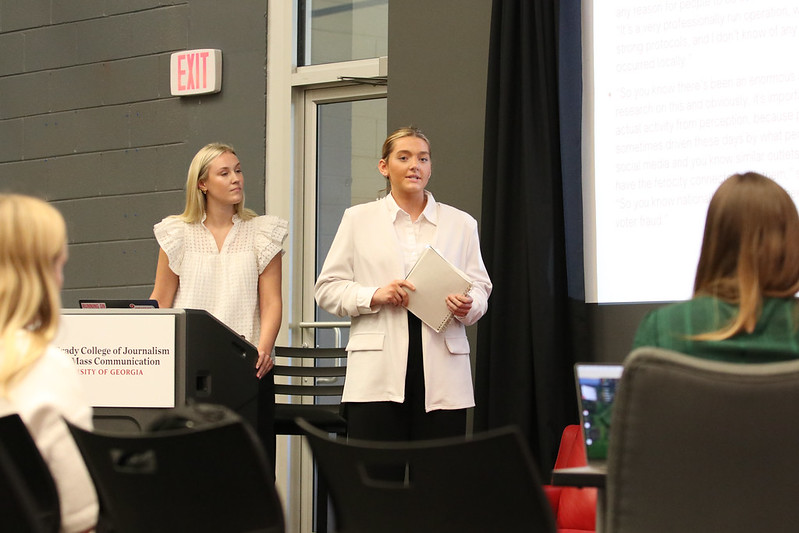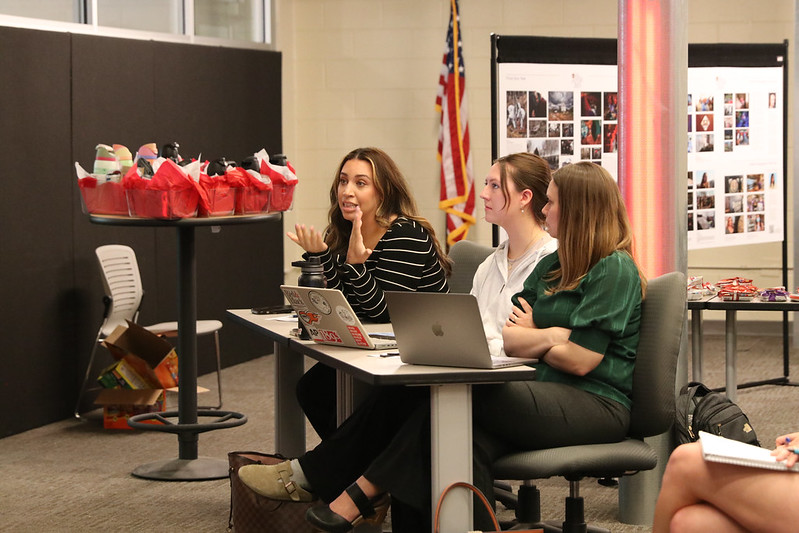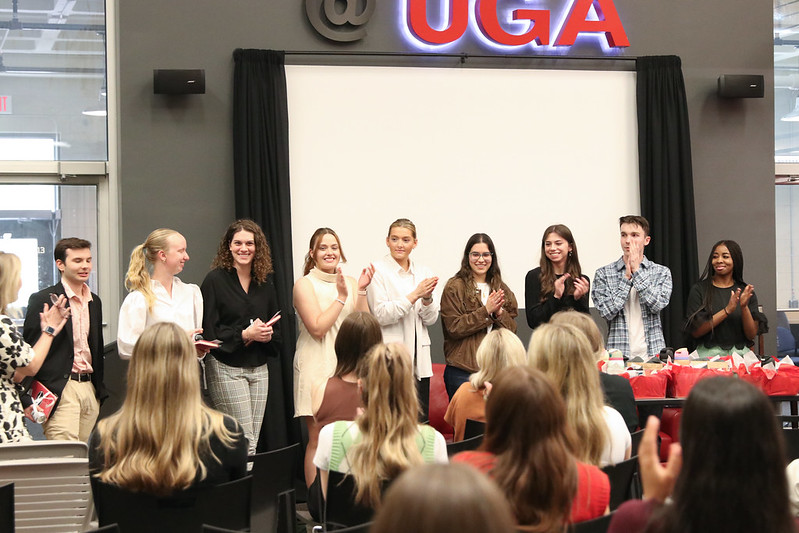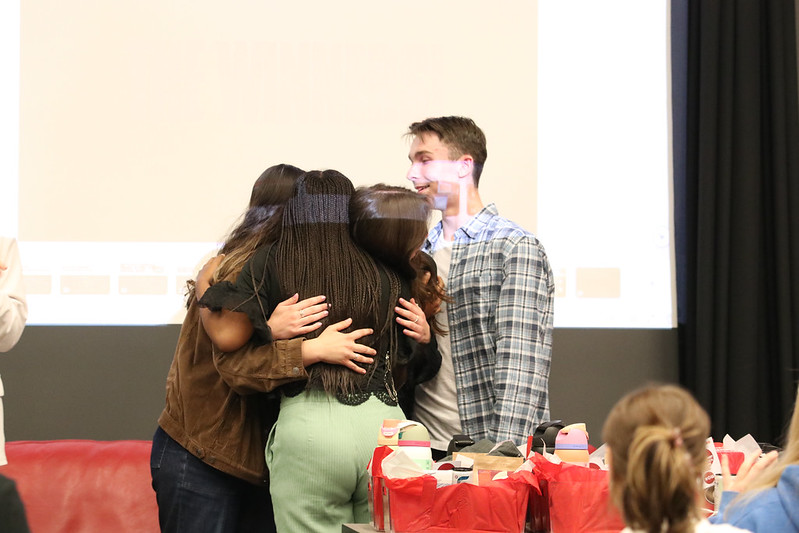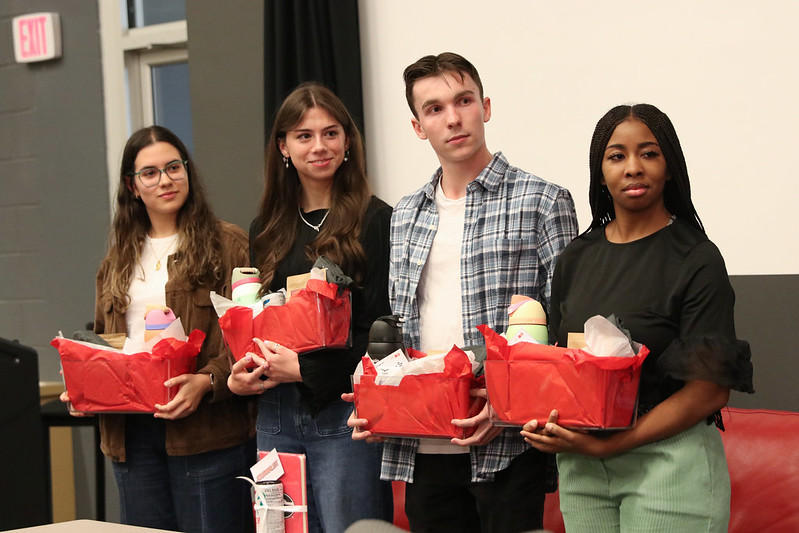Reporting I students compete in beat story pitch competition
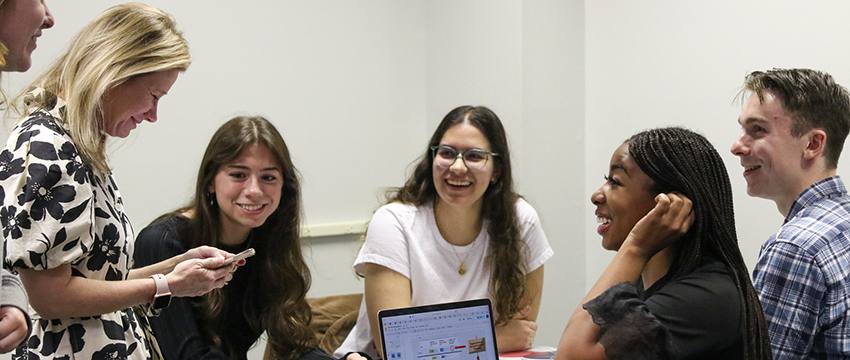
Reporting I students compete in beat story pitch competition
A pitch focusing on reviving in-person student activism in a digital age won the University of Georgia’s spring 2024 Beat Story Pitch Competition.
The competition allows students in the Reporting I course, which has 160-180 students each semester, to practice the story pitch process, providing first-hand experience in the preliminary research, interviewing and planning that encompasses a successful proposal. The competition happens at the end of each semester.
A total of 42 “beat groups” with 157 students from all nine sections of Reporting I (JOUR 3090) competed on April 12, with prizes awarded to the first, second and third-place groups. The “beats,” or areas of coverage for the semester, were business and consumer news, city/county government, diversity & equity, local music and sustainability.
The Grady College of Journalism and Mass Communication students presented their five-minute pitches before 25 judges, including journalism department faculty, professional journalists, student media outlet leaders, and the finalists and winners of the fall 2023 competition.
Pitches included stories on campus safety following the death of Laken Riley, sustainable transportation in Athens-Clarke County, the influx of Mexican restaurants in Athens, new efforts by nonprofits such as Shell to Shore, the impact of the Athens Music Walk of Fame, accessible buildings at UGA and trends in graduation photography. Story types included local enterprise, trend stories, profiles and behind-the-scenes pieces.
The final judging panel was composed of Dr. Amanda Bright, senior journalism academic professional in the Grady College of Journalism and Mass Communication; Nicole Williams, senior manager, partnerships, The Atlanta Journal-Constitution/Cox Enterprises; and Elizabeth Rymarev, a senior journalism major and editor in chief, The Red & Black.
“As an editor with our two news organization capstones at Grady College, it was thrilling to watch these Reporting I students interview, collect strong visuals, research and pitch stories that truly served a community,” said Bright, who also serves as director of the Journalism Innovation Lab in the Cox Institute for Journalism Innovation, Management & Leadership, managing editor of Newsource, and instructor and assistant editor for The Oglethorpe Echo. “I look forward to having them in our newsrooms in a few short semesters.”
Rymarev added that the level of detailed reporting and research prepared the students to sit down and start writing a multimedia piece.
“This pitch competition replicates the news gathering process that goes into making a robust story, from sourcing, to interviews, to visuals, to then promoting it on social media,” she said. “Once you have gathered all of the answers to your questions and spoken to a diverse group of people, then your story basically writes itself at that point, and I’m happy to see that each group can do that in their first reporting class.”
Williams said she was impressed that each group had an entirely different story pitch, which shows the depths of newsgathering even in a small city.
“It’s easy to stick to campus events but as a journalist, you have to think outside of the box to find those pieces that allow you to truly tell a unique story that’s impactful to your audience,” she said.
A “beat mentor” helped groups prepare for the in-person pitches, which kicked off in classes from 9:10 a.m.-1:30 p.m. on Friday, April 12. The beat mentors are former students who provided peer support and guidance during the 2023-2024 school year using $2,000 from the UGA Provost Office’s Teaching Enhancement and Innovation Fund. The winning group from each of the nine class sessions advanced to the final round that afternoon in Studio 100 in the Journalism Building to present before the three final round judges. More than 50 students attended the final round, including beat mentors Helen Sorme and Kati Putman.
“It’s more of a hands-on experience than anything,” said Putman, a third-year journalism major and beat mentor. “I mainly looked at their pitches and went over their budget line to make sure they had a story and not just a topic. They blew me away with their work and did an amazing job.”
First Place
The first-place winning group, Lori Johnston’s Diversity, Equity and Inclusion group included second-year journalism major Ethan Wilcox, third-year public relations major Gabby Mota, second-year PR major Ally Kramer and third-year PR major Torie Hayes.
The group pitched a story regarding UGA’s activist student organizations making conscious efforts to lean away from reliance on social media and expand in-person efforts for the upcoming election. The group interviewed 13 people from political and social justice activism groups who find their messages are better heard in person. The group was curious how topics such as the Laken Riley Act and the Israel-Hamas war might influence voters ahead of the presidential election.
The four captured photos and videos of student protests throughout the semester and collected statistics regarding Georgia’s youth voter turnout from the Center for Information and Research on Civic Learning and Engagement.
The group had to adapt the angle of their story throughout the process, making quick directional changes to fit the interviews and information they gathered.
“You have to keep searching for the story,” Hayes said. “We had an idea, but that idea wasn’t going to work, so you have to keep digging through the trash until you find your actual story.”
The insight gained after participating in the competition allowed group members to form a different outlook on the pitching process.
“I definitely think I have a lot more respect for journalists, cause you have to have the complete package if you want your idea to actually be approved,” Wilcox said.
The group members also formed a better understanding of the forward-thinking and preparation that goes into pitches.
“You need to have a lot of background research, you need to already have the interviews done, already have the footage to present a whole story,” Mota said.
The first-place winners won a prize pack with an Owala bottle, 1000 Faces Coffee, Condor Chocolates and more.
Second Place
The second-place group was Dr. Andrea Hudson’s government group, which included second-year PR major Jaclyn Griffin, second-year PR major Ella Floyd and second-year journalism major Rebecca Schillinger.
This group presented their story idea covering Athenians’ concerns about election integrity in the wake of 2020’s presidential election.
The group collected statistics, including Pew Research Center citations regarding the declining voter confidence in election administration. They also interviewed sources such as Athens-Clarke County Mayor Kelly Girtz, Athens-Clarke County poll workers, elections assistant Lisa McGlaun, voters and candidates to frame their story about the upcoming election’s security.
“We realized that the big election is coming up and then we just had some elections in Athens,” Schillinger said.
Before beginning the beat story pitch competition, group members said they felt uncertain, unprepared and nervous about the process. They grew more confident after presenting their pitch and understanding the competition’s purpose.
“You’re always going to have to pitch yourself, you’re always going to have to pitch an idea, a plan and so being able to practice that pitch, even if it’s for a journalism class, was just very good,” Griffin said. “It was very good practice for the future.”
The second-place winners won a prize pack with an Owala bottle and more.
Third Place
Professor Tracy Coley’s local music group featured second-year journalism major Molly Moore, second-year journalism and French major Susanna Johnson, second-year political science and PR major Andy Wyatt and first-year PR major Mary Charles Johnson.
The group researched the musical adaptation about the history of Athens’ Linnentown neighborhood and community activist Hattie Thomas Whitehead. The musical, which debuted the weekend of the story pitch competition, channels the generational trauma Black Athenians experienced during the 1960s due to urban renewal.
The group interviewed Whitehead along with Athens-Clarke County district commissioners, Linnentown residents, and the play’s director and editor. They also collected demographic statistics, including how many families and people lived in the town and old maps of where Linnentown once stood.
“I enjoyed talking to Hattie Thomas Whitehead,” Wyatt said. “We had many questions for her, and she was very patient with us. She really let us delve into her history.”
The group members focused on the fundamentals of presenting the story.
“Some things that we really learned throughout the process were how to integrate different voices together and represent them in a cohesive manner,” Wyatt said.
The third-place winners won a prize pack with a UGA-themed writing journal and more.
Developing key skills
The finalists said they found the competition experience an enlightening glimpse into the story-pitching process, and the judges agreed. Each beat group provided a written story pitch document with expanded quotes and multimedia elements, as noted in the assignment instructions, in addition to delivering the in-person story pitch. Each student also posted on social media about their reporting process.
“Each group cared deeply about their story, and what it means to the community,” Rymarev said. “They were incredibly intentional in choosing their sources and selecting quotes from interviews, and they brought so much professionalism to their presentations. They were well-prepared!”
The beat story pitch competition debuted in the fall 2023 semester. The next beat story pitch competition is planned for November 2024.
“The story pitch competition is such an incredible tool for future journalists. This is something they’ll carry with them into their careers, and it will certainly set them up a step ahead of their peers in the newsroom,” Williams said. “Once you step into your first role, no one is walking you through those meetings with your editors. You’re expected to come with ideas from all angles and this competition is preparing them for that.”
To see more photos view the Flickr album here.
Authors: Sam Tupper and Karmen Morrison
